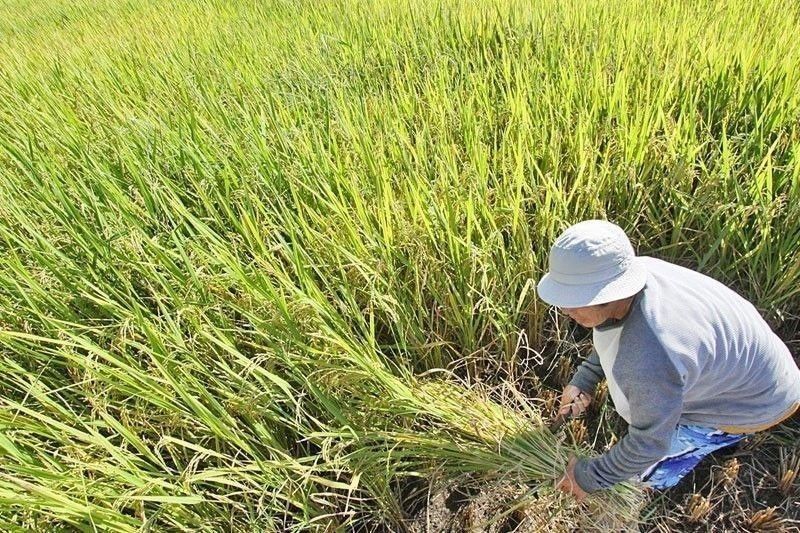Rice farmers accept Duterte apology but want action

MANILA, Philippines — Local farmers accepted President Duterte’s apology, but demanded that concrete actions be taken as their losses due to the steep drop in palay prices are expected to reach P140 billion for the whole year.
In a briefing yesterday, the Federation of Free Farmers (FFF) said it had accepted Duterte’s apology, but also urged the Chief Executive to do something about the farmers’ situation.
“If the President apologizes, it means that he knows something is wrong, but an apology is not enough; we need concrete action,” FFF president Leonardo Montemayor said.
“When the President says sorry, it’s a good sign that he has accepted that there is a problem and he wants to make amends,” he added.
Over the weekend, Duterte apologized to farmers for the government’s shortcomings to the agriculture sector, but maintained that he is not repealing the rice tariffication law.
“What I am saying to our people is that, do not despair, we can always correct a wrong. I apologize to you if the result you wanted to get during the early days of my administration has been well delayed or not good, not to your expectations. If I can’t help you, then I have no business being here, I have the goal, I will immediately do something about it,” Dutere said.
Kilusang Magbubukid ng Pilipinas national chairman Rafael Mariano echoed Montemayor’s statement as he expressed hope that the President is sincere in his apology.
“On one hand, we can accept that, but we need something concrete from the government to reverse this damaging effect of the law,” Mariano said.
“We estimate that total losses of farmers for the year could reach P140 billion or P30,000 per hectare. This is more than 10 times the damage inflicted by Typhoon Yolanda on the agriculture sector in 2013,” Montemayor said.
“The severe drop in palay prices and the losses incurred by millions of rice farmers have resulted in a brewing socio-economic and humanitarian crisis in the already poverty-stricken areas,” he added.
Farmers are demanding that the government act immediately to compensate them for the losses they have incurred.
They are also not giving up on their call for the law’s immediate suspension and for a comprehensive review of its effects on the industry.
“We demand that all affected farmers be adequately compensated for their actual and projected losses over successive cropping seasons and be given subsidies to help them cope with higher prices of fertilizers and other farm inputs,” Montemayor said.
The surge in imports has resulted in the drastic and continuous drop in palay farmgate prices from their peak of P23.14 per kilogram in September 2018 to only P15.50 per kilo last month.
This represents a 33-percent drop in prices and farm incomes. Farmers are claiming that actual situation on the ground is much worse.
Rice accounts for 20 percent of the gross value added of Philippine agriculture. The industry employs 2.1 million farmers. Local farmers supply 90 to 95 percent of the country’s rice requirements.
No such order
Meanwhile, the government clarified that it is not poised to stop rice importation even if farmers are losing billions from the steep drop in palay prices brought about by the liberalization of the industry.
Malacañang yesterday clarified a television report that Duterte had suspended rice importation, which would contradict the law that he signed nine months ago.
“As of this time, there is no order to stop rice importation given to Secretary (William) Dar of the Department of Agriculture (DA) per the latter,” presidential spokesperson Salvador Panelo said in a statement.
In a message to The STAR, Dar maintained that he has no knowledge of such an order from the Chief Executive.
“None so far,” he said.
Even Finance Secretary Carlos Dominguez III said there is no plan to suspend in any way the rice tariffication law, which Duterte signed in February to allow the unlimited entry of rice in a bid to bring down retail prices of Filipinos’ main staple.
The move, however, also pulled down prices of palay to the detriment of local farmers.
With stopping importation no longer in the picture, the DA will instead implement stricter and more stringent measures, particularly on the issuance of sanitary and phytosanitary import clearance for importers.
Over the last few months, data have shown that country imported an average of 245,000 metric tons a month. This has gone down to about 85,000 MT as the government moves toward stricter measures. – With Alexis Romero
- Latest
- Trending



























